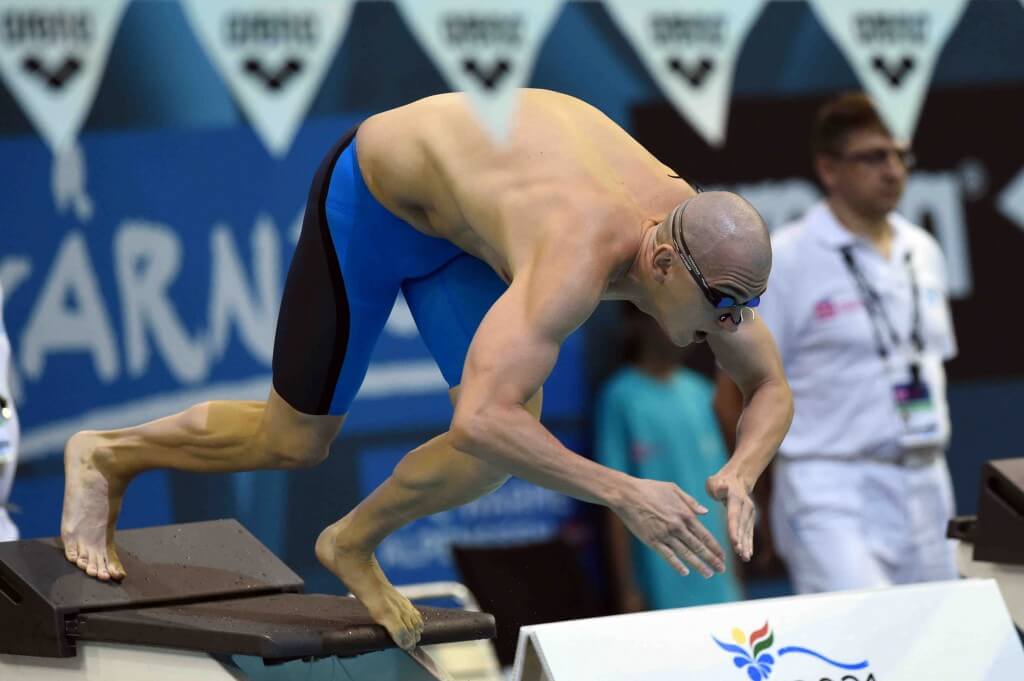Laszlo Cseh Makes a Statement at European Championships

By David Rieder
If he swam in another era, Laszlo Cseh might have gone down as one of the all-time greats in the sport of swimming.
As things turned out, Cseh has spent most of his career on lower steps of the podium looking up at Michael Phelps and Ryan Lochte.
Consider: Cseh has five career Olympic medals, all of them silver or bronze and all of them in races that Phelps won. He has won two World titles‒both of them in races without Phelps‒but also five silvers and five bronzes, and in seven of those ten races, it was Phelps, Lochte or Aaron Peirsol that had won gold, and the Star Spangled Banner was playing.
Cseh had a frustrating Olympics in London four years ago, finishing ninth in the 400 IM, one spot behind‒you guessed it‒Phelps, and winning a bronze in the 200 IM behind‒wait for it‒Phelps and Lochte. But instead of choosing between retiring and pressing onward, Cseh made a radical career choice: he totally changed events.
Cseh had dabbled in butterfly before‒one of his Olympic silvers came in the 200 fly in Beijing in 2008‒but he fully embraced those events as he pushed for a fourth Olympic Games. Cseh won the silver in the 100 fly at the 2013 World Championships before winning one medal of each color in 2015: gold in the 200 fly, silver in the 100 fly and bronze in the 50 fly.
But then along came Phelps once again to put a damper on the celebration of Cseh’s World title. Phelps dropped a 1:52.94 at U.S. Nationals in San Antonio a few days later to surpass Cseh’s winning time of 1:53.48 from Kazan. The time was the fastest recorded since polyurethane and full-body suits were banned at the end of 2013.
But on Thursday, Cseh sent some return fire back across the Atlantic as he dropped a 1:52.91 to win the European title in the 200 fly. Only Phelps and Cseh himself have ever surpassed that time. Phelps undoubtedly has his sights set on dropping his own time a bit further, but he surely took notice of what his longtime rival did in the very same pool in which Phelps was touched out by Chad le Clos for the 200 fly Olympic gold four years ago.
Phelps and Cseh expect to meet in the Olympic final of the 200 fly this summer, which would be the sixth time the two have squared off in that setting. (The 100 fly later in the week could make it seven.) In the past it was Phelps and then Cseh, but maybe not this time.
*British breaststroke beast strikes again. It cannot be a surprise that Ross Murdoch took down World Champion Marco Koch for the 200 breast European title. After all, he owns the Commonwealth record in the event at 2:07.30 and earlier in the week finished second behind fellow Brit Adam Peaty for the European title in the 100 breast. In the 200 final, Murdoch’s 2:08.33 just edged Koch’s 2:08.40.
It was one of the fastest races of the meet and among the most competitive, but there will not be a rematch at the Olympics in a few months’ time. That’s because Murdoch fell victim to the two-per-country rule when he finished third at his country’s Olympic Trials behind Andrew Willis and Craig Benson. The field was so deep that 2012 Olympic silver medalist Michael Jamieson finished fifth in that race and 100 breast world record-holder Peaty sixth.
Americans know all too well the pain of finishing third at Olympic Trials‒look no further than the men’s 100 back, where would-be medal contenders like Lochte (2008) and David Plummer (2012) regularly finish third at Trials. Murdoch, of course, will have some consolation as he gets to compete in the 100 breast in London‒and he will have a chance at a medal‒but his European title is just further evidence of the massive depth Britain has built up in men’s breaststroke.




